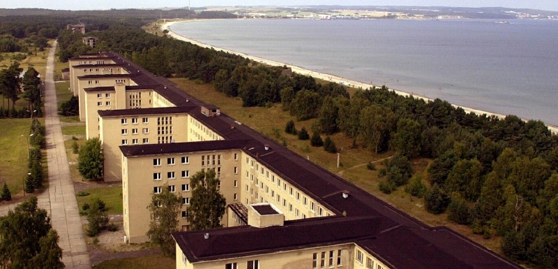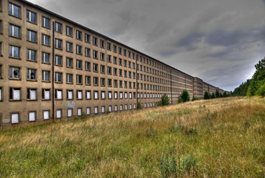
The Nazi recreational complex Prora on Rügen is largely deteriorating
 |
Binz (Germany) - The extensive Nazi recreational complex Prora on the Baltic island of Rügen was designed to accommodate 20,000 tourists according to the builders' plans. Seventy years after the end of World War II, it partially serves a recreational function, but most of the buildings are deteriorating and becoming overgrown with spontaneous vegetation. The complex is unlikely to ever reach full utilization, as the infrastructure on Rügen would not be able to handle additional thousands of tourists.
The four-kilometer-long colossus, which follows the coastline of Prorer Wiek bay, was planned by the Nazi labor organization Kraft durch Freude (Strength Through Joy) as a model recreational facility for German workers. All double rooms of ten square meters were supposed to have sea views, and large communal rooms, gyms, and a swimming pool were to be prepared for visitors. The foundation stone of the complex was laid in 1936, construction began in 1938, and by the outbreak of the war, the rough construction of eight half-kilometer accommodation blocks had been completed.
 |
The remaining part of Prora was occupied by the East German army and used as barracks. After the reunification of Germany in 1990, the property was transferred to state ownership, which sold it to private investors in 2004 after several unsuccessful attempts. They converted part of the complex into a hostel and part into holiday apartments, but most of the massive structure remains unused.
"From a static point of view, the whole complex is fine, but for it to be used, significant investment would be needed. The facades, which were created during the time when Prora was used by the East German army, are waterlogged because no one has taken care of them since reunification. Moreover, water is penetrating into the basements, accumulating there as it is not being pumped out. In other parts of the basements, litter is piling up, illegally dumped by people," Seldler said.
The situation is further complicated by the fact that the Nazi complex is under heritage protection. "The state protects Prora as a monument to gigantism, in the spirit of which the Nazis planned their buildings. Heritage protection applies to the condition in which the Nazis left the complex, that is, to the rough construction. While this allows for the interiors to be renovated, as the hostel operators did, adding balconies is prohibited. And balconies are among the basic amenities sought by tourists who wish to rent apartment accommodation on the coast of Rügen for the entire season," Seldler explains.
As a result, most of the complex remains empty. The area around Prora is overgrown with pine trees, and the view of the sea that the recreational complex once offered from all rooms has been replaced by greenery. The social halls were never completed, their ruins are gradually crumbling, and access to them is prohibited for safety reasons. A nightclub and restaurant operate in the former administrative building of the complex, and part of the complex serves the Prora Documentation Center, which commemorates the circumstances of the creation of the recreational center and its use for Nazi propaganda.
"The idea that Prora would ever offer accommodation for 20,000 people, or even just half of that, is now inconceivable," Seldler said. "It’s not just due to the state of the facilities. The tourist capacity of Rügen is already full. There is only one main road leading here from the mainland, and in the summer, when the tourist season peaks, it is completely overloaded during the shift changes. There simply isn’t room for more cars," he concluded.
The English translation is powered by AI tool. Switch to Czech to view the original text source.
0 comments
add comment












